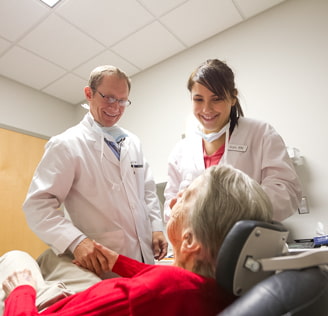
November 12, 2020
At a Glance: What You Need to Know About Diabetes and Your Eyes
More than 463 million adults across the world are living with diabetes or are affected by diabetes as of 2019 and according to the International Diabetes Federation, those numbers continue to rise each year. Diabetes is the leading cause of permanent blindness in the United States according to Prevent Blindness and damage from diabetes can cause permanent vision loss that cannot be fixed. Awareness, advocacy, and education are key in helping prevent or delay vision loss.
November is National Diabetes Awareness Month in America and every year, November 14th is celebrated as World Diabetes Day. World Diabetes Day is said to have been created in 1991 by the International Diabetes Federation in honor of Sir Frederick Banting's birthday, who co-discovered insulin along with Charles Best in 1922. The World Diabetes campaign is the world’s largest diabetes awareness campaign reaching over one billion people globally in more than 160 countries.
What is diabetes?
 Diabetes is a health condition that affects how your body converts food into energy. A majority of the food you eat is broken down into sugar (called glucose) and is released into your bloodstream. As your blood sugar rises, it signals your pancreas to release insulin. With diabetes, either your body doesn’t make enough insulin or can’t use the insulin like it should. Individuals with diabetes often have to self-check their glucose levels and should also keep an eye on their vision. Over time, diabetes can cause numerous health problems and even vision loss.
Diabetes is a health condition that affects how your body converts food into energy. A majority of the food you eat is broken down into sugar (called glucose) and is released into your bloodstream. As your blood sugar rises, it signals your pancreas to release insulin. With diabetes, either your body doesn’t make enough insulin or can’t use the insulin like it should. Individuals with diabetes often have to self-check their glucose levels and should also keep an eye on their vision. Over time, diabetes can cause numerous health problems and even vision loss.
All diabetics are at risk for diabetic eye disease making eye exams crucial. Early detection is why it is so important for diabetics to have a dilated eye exam with their eye doctor at least once a year. Your eye doctor can monitor your vision, diagnose, treat and prevent several eye diseases. However, for some eye diseases, such as diabetic eye disease, they may refer you to a Wolfe Eye Clinic diabetic retinopathy doctor near you for further treatment, if needed. Diabetic eye disease treatments can vary based upon each individual patient’s conditions. Our Iowa retina specialists will work with your eye doctor to provide additional treatment or even a second opinion.
What are signs and symptoms of diabetic eye disease?
Many individuals with diabetic eye disease have normal vision and no symptoms at all until later stages of the disease. When symptoms develop, they may include:
- Blurred or decreased vision
- Distortion
- Floaters
- Appearance of a dark curtain or shade over part of the field of vision
If you are diabetic and have any of the above symptoms, you should be evaluated by your eye doctor immediately. If your eye doctor refers you to Wolfe Eye Clinic, our retina specialists will carefully examine your dilated eyes to come up with the best treatment plan for you. The most common treatment for diabetic eye disease is an injection of medication into the eye. These injections are painless and deliver medicine inside the eye near the retina to block harmful signals that cause blood vessel leakage and growth of abnormal blood vessels. This treatment helps preserve vision, with the goal of keeping the disease under control. In some cases, laser treatment is performed to treat diabetic eye disease. The laser is a concentrated form of light which can be used to seal leaking blood vessels. Wolfe Eye Clinic retina eye surgeons perform both injections and laser treatments at our retina clinics across the state of Iowa.
Find a Diabetic Retinopathy Doctor Near you
 At Wolfe Eye Clinic, our Iowa retina specialists are here to help personally answer any questions about your retina eye care needs and work closely alongside your eye doctor to provide the best diabetic eye disease treatment for you. It is important to schedule regular eye exams with your eye doctor and we will be here for you as needed for any further treatment. Our retina specialists have expertise in treating diabetic eye disease and are fellowship-trained ophthalmologists who are known for providing the highest quality specialty eye care across the state. Wolfe Eye Clinic retina services are offered in Ames, Cedar Falls, Hiawatha (Cedar Rapids), Des Moines, Fort Dodge, Iowa City, Marshalltown, Ottumwa, Pleasant Hill, Spencer and Waterloo. If you would like more information on diabetic eye disease, you can request information here, or call us at (833) 474-5850.
At Wolfe Eye Clinic, our Iowa retina specialists are here to help personally answer any questions about your retina eye care needs and work closely alongside your eye doctor to provide the best diabetic eye disease treatment for you. It is important to schedule regular eye exams with your eye doctor and we will be here for you as needed for any further treatment. Our retina specialists have expertise in treating diabetic eye disease and are fellowship-trained ophthalmologists who are known for providing the highest quality specialty eye care across the state. Wolfe Eye Clinic retina services are offered in Ames, Cedar Falls, Hiawatha (Cedar Rapids), Des Moines, Fort Dodge, Iowa City, Marshalltown, Ottumwa, Pleasant Hill, Spencer and Waterloo. If you would like more information on diabetic eye disease, you can request information here, or call us at (833) 474-5850.